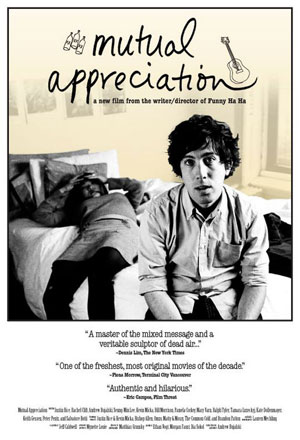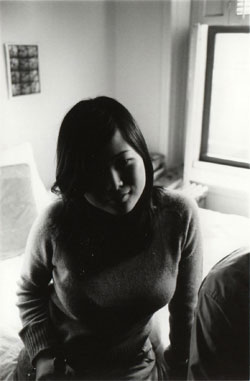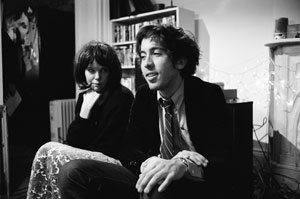 I’ve been really dissatisfied with indie film for the last couple of years. It seems like indie has come to mean “costing less than 50 million dollars,” and often big stars going for Oscars or cred. Mutual Appreciation is a return to the real kind of indie – a shoestring budget, cast with non-actors and about little, relatable human stories.
I’ve been really dissatisfied with indie film for the last couple of years. It seems like indie has come to mean “costing less than 50 million dollars,” and often big stars going for Oscars or cred. Mutual Appreciation is a return to the real kind of indie – a shoestring budget, cast with non-actors and about little, relatable human stories.
It’s director Andrew Bujalski’s second feature, following up the very well received Funny Ha Ha (it made AO Scott’s New York Times’ ten best list), remains minimal. Shot in black and white in often small Brooklyn apartments, Mutual Appreciation is about Alan, a burgeoning rock star whose band has left him just when he’s about to do a big gig in New York. His college buddy lives in Brooklyn, and Alan finds himself very much into the buddy’s girlfriend, and the attraction might be mutual. The plot sounds thin, but Bujalski layers things in such a way that the movie becomes an examination of everything from art to gender. It’s the kind of movie that, once discovered, is never lost again. Check out the Mutual Appreciation wesbite right here.
I had a chance to talk to Bujalski on the phone yesterday. Here’s what we talked about.
When I started watching Mutual Appreciation, I said ‘Oh man, a movie about Williamsburg hipsters – I am so going to hate this.’ But it won me over completely. Even as I was annoyed to see Northsix and everything, I fell for the film. What made you want to set it in Williamsburg?
Bujalski: Northsix is really the only place we shot in Williamsburg. It’s been a funny critical thing – I get tagged with that a lot. I get it, I get why people sort of jump to that conclusion. But as far as setting it in New York and Brooklyn in general, it wasn’t written as a New York movie, but it came about as circumstance – I wanted to do the movie with Justin [Rice], who lives here. And a couple of the other folks I wanted to work with lived here. Now obviously having made that decision it took on more importance as we made the film. Now I can’t imagine it not being in New York. I think New York dovetails really well with the ambitions the characters have.
It’s interesting hearing you say that, because what Alan talks about when he finds that he loves New York, when he loves the community, all sound so New York specific.
Bujalski: I can’t remember exactly what was in the first draft of the script, but that kind of dialogue grew out of the New York connection.
The film’s dialogue doesn’t feel improv so much as it just feels natural. How much is scripted, how much do you come up with on set? How does that work?
Bujalski: I write a full script, which is a totally conventional looking screenplay. I try to be real specific and I try to get at all the conversational lulls and all these things, but I don’t do what David Mamet does, where you try to get someone to replicate that perfectly. Then we pretty much throw that out when we get to set and try to leave a lot of room for people to bring to it what they what to bring to it.
The structure tends to stick pretty well, but some of the dialogue comes from the page and some comes from the moment. I get this question so often – I wish I could have a computer that could tell you it’s 53% of one.
 How hard is it to find people who can handle that style of acting? Is it tough to cast a film like this?
How hard is it to find people who can handle that style of acting? Is it tough to cast a film like this?
Bujalski: Yes and no. It’s not a skill that everyone has. I guess it takes a certain amount of comfort, and it’s hard to be comfortable in front of the camera. Nobody in the film is a professional actor, so everybody is taking a leap of faith on it. They’re taking a leap of faith on me and I on them and us all on the project. I guess the essential cornerstone of acting is being able to pretend for a minute. But some people do freeze up – I try to get a screen test of everybody and see what’s going to happen when there’s a camera in the room.
Funny Ha Ha has gotten you some great reviews and lots of press. Are you sticking with the smaller, indie films, or are you ready to go to Hollywood?
Bujalski: I got my first Hollywood screenwriting gig. That’s what’s paying my rent at the moment. I’m interested in getting my toe in that world, and if I can do the classic John Sayles model, which I think a lot of independents aspire to – where you get paid to work on their stuff so you can do your own stuff – I think that would be my fantasy. But definitely trying to keep in my own world.
I’ve been lucky because Funny Ha Ha had such a long, slow burn lifespan that we shot most of Mutual before all the attention for Funny Ha Ha. Mutual was shot in October of 03, and Funny Ha Ha was playing festivals at that time but it still had, in a way none of us could have predicted, a while to go in its peculiar lifespan. That was great because we were still somewhat in the protective bubble of naiveté when we did Mutual; I don’t know how difficult it will be to recreate that bubble once more, but I’d like to shoot another small film next year. I’m trying to gear up to make that happen.
I’m assuming that the small film would be another movie about human relationships. What’s the screenwriting gig – are you going the exact opposite way and doing an action film?
Bujalski: I actually have no idea of what I’m allowed to disclose, but it’s an adaptation of a novel. It’s really fun to do – at this point I’ve turned in my first draft and I’ve just started to get my first notes back. Obviously it’s a whole different world – I’ve never adapted a novel before, I’ve never worked with studio people before. I’m used to working in an autonomous manner. It’s been fun, but I don’t know where it’s headed – I’m still in the honeymoon period. I’ve been left to my own devices to write.
At the end of Mutual Appreciation, where do you see these characters going? Can these friendships last?
Bujalski: I don’t know. At the point where the movie ends my opinion is no more valid than anybody else’s really. My job is to shepherd those characters through that 109 minutes and from there on out it’s up to you.
Do you consider yourself an optimistic person?
Bujalski: That’s a good question.
Because the ending feels optimistic to me.
Bujalski: One of the things I really enjoy about putting these movies out in the world is the way that when you make a movie that’s observational and you’re not trying to orchestrate the audience’s emotions too much, you get wildly varying reactions. At Q&As I’ve been had the whole gambit from people saying, ‘I love how optimistic it was,’ to people saying, ‘Why are you such a nihilist?’ And you know, it’s all equally valid to me. As for my own take – I have different feelings on different days.
the audience’s emotions too much, you get wildly varying reactions. At Q&As I’ve been had the whole gambit from people saying, ‘I love how optimistic it was,’ to people saying, ‘Why are you such a nihilist?’ And you know, it’s all equally valid to me. As for my own take – I have different feelings on different days.
I feel like there aren’t people making movies like this very often anymore.
Bujalski: I agree. Who knows what the future holds, but I feel like it works to the degree that we’ve been able to get good press and get attention on these films because they’re a novelty these days.
What are your influences?
Bujalski: There are certain questions that are so direct and straightforward that I find them impossible to answer.
Anything and nothing. There are a few obvious reference points that get trotted out a lot in reviews, and those are great and they’re all filmmakers I admire, but I feel like I have taken things from other places as well. Certainly in Mutual Appreciation I felt like I was borrowing some structural ideas from Ferris Bueller, and no critic has called me out on that.
That’s interesting. I talk to a lot of directors, and they often say something like that. ‘Everyone sees the influence of Film X, but no one see out of left field influence from Film B, and I feel like that was where I got most of it from.’
Bujalski: In Funny Ha Ha I always felt like – the film has an opening scene that’s a prologue scene where a character appears, a tattoo artist, who you never hear from again in the rest of the film. To me, writing that prologue, that separate adventure that reflects on the rest of the film but is discrete from it, to me is borrowed from the James Bond movies. But again, nobody has ever accused me of that.
Do you read all your reviews?
Bujalski: I made a New Year’s resolution not to and I have not kept it.
It’s tough, right? You want that feedback.
Bujalski: There’s a lot to it. Part of it is narcissism, but also since we’re self-distributing the film it’s hard for me to stay out of that.
What’s the future of Mutual Appreciation? What’s going to be the release pattern, and is there going to be a DVD?
Bujalski: The movie opens in New York this weekend, and then it kind of fans out across the country. We open in LA on the 8th, we open in Boston on the 13th, and more after that.
Then in February we’re putting out the DVD. Right now we’re struggling to finish all the special features for the DVD. I made more work for myself than I probably should have; we have a little short film on there featuring a couple of minor characters from Mutual – the guy who plays the dad and Walter, the bald music industry guy. They have this mysterious offscreen relationship in the film, so I thought it would be fun to have them meet up and have a thing together. It was small and goofy, but it was fun to direct something. It’s hard to make the opportunity to do that.
And we’re going to have a commentary track with commentary by the cast and crew. Which I don’t think any of us has done before. So it might be more interesting in theory than in practice.